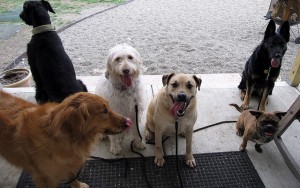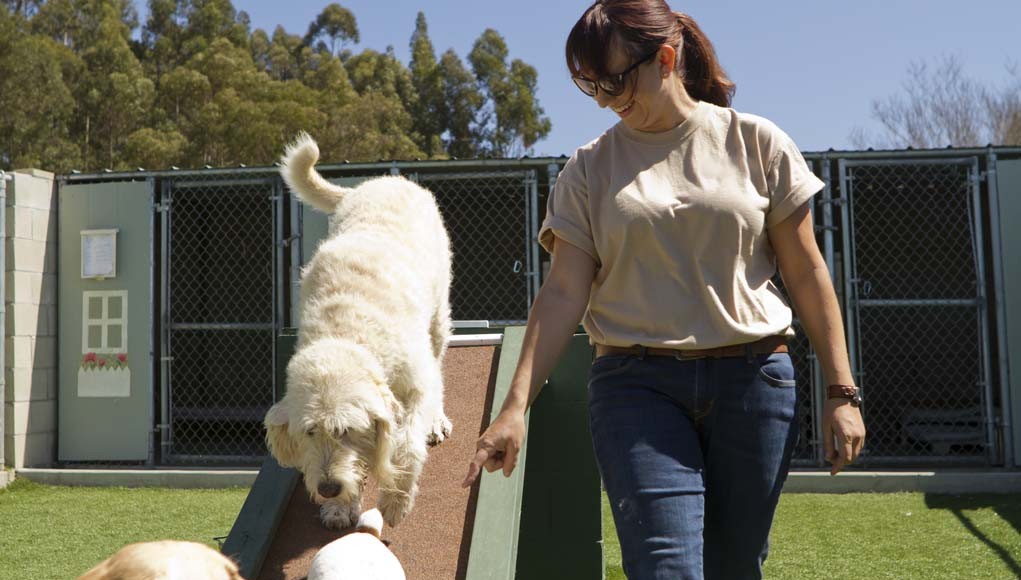You love dogs and want to open a dog boarding business, but you aren't sure where to begin. Unfortunately, running a successful dog kennel takes more than just a love of dogs. Before you can turn your passion into a thriving and profitable enterprise, you will need to know how to write a dog boarding business plan that's solid.
A proper business plan is vital in starting any business, as well as the #1 tool for gathering investors. Before you even consider taking a single dog into your care, you must research and map out a proper strategy. This strategy will be the guide that outlines your goals and brings your vision to life.
There are business plan templates available online to help you, or you can come up with your own. There are a lot of variables when planning a business, so everyone's business plans will look a little different, but they will all state the details of the business, the scope of the business, how the owner will get the business started, and what the owners' plans are for the near future.

You may be thinking that your dog boarding business is going to be a small operation run from your home and you'll be tending to the dogs of your friends, family, and neighbors.
So, why would you need a business plan?
No matter how small your business, you're going to have some kind of startup costs. Granted, your business may not need much, but you'll still need some basic supplies and possibly a slight remodel of the intended location. Your also going to need some amount of advertising and you'll have insurance and legal issues to work out as well.
Don't think for a second that you can get away with not having a business plan. If you're serious about your business you need a solid plan that will help you start it, build it up, and run it for years to come. Think of your business plan as a road map for the next 5+ years of your business's existence.
How to Write a Dog Boarding Business Plan
The scope of your business will vary from other dog boarding businesses, which will effect the details of your business plan, but this will give you a general idea of the parts of a business plan, why they are all important, and what to include in your plan.
RELATED: 10 Great Dog Business Ideas for Petreneurs
Before you get started you need to make sure that there is a need for your business in your area. Every pet owner travels at some time or another or has to board their dog for any number of other reasons. Unless there are other similar businesses in your area, you should be good to go.
[optin-monster-shortcode id=”mmevqhqfl46p1is5″]
However, don't count your idea out just because there is another boarding business in your local area. Is there a need for another one? Maybe you live in an urban area and the local dog boarding facility is full most of the time with a wait list for cancellations. In that case you could probably open your business up next door and still get customers.
Do some research to find out what your local competition will be and whether or not this type of business is needed in your area. Once you've established a need, you can move on with creating your business plan.
State the Goals of Your Dog Boarding Business
The first part of any business plan is a brief overview of what you have in mind for your particular business. Investors and bankers know what a dog boarding business is, but what are the specific details of your operation.
Here is an example: I will start my dog boarding business, Forever Friends Kennel and Boarding, in my home. I will convert my existing two car garage into a kenneling facility. If things go well, there is room for expansion in a few years. I will not take anymore than 6 dogs at a time. I will provide doggy daycare services as well.
It is also necessary to list all related experience you and your staff will bring to the venture when writing a business plan for your dog kennel. Care of an owner's pets can be both complicated and emotional, and the more experience you bring to the table, the more peace-of-mind your clients will have.

This section should state your dog-related accomplishments, relevant pet care experience, credentials and all other pertinent qualifications. This part is brief, but it shows the reader exactly what your intentions are.
Be honest in your business plan. Investors aren't necessarily looking to back a business that has intentions on growing into a franchise, they just want to see that you have a plan to make your business, however big or small it may be, successful.
Executive Summary
Write a thorough but brief summary of your dog boarding business and how you plan for its success. Be sure to add a full list of the services that your boarding facility will offer. Some dog kennels operate full boarding facilities and even offer dog training for the animals and their owners while others provide day services only. Supply as complete a picture as you can of your new business.
Your executive summary should be written last, after you have done all the groundwork in preparing your business plan – it is, after all, meant to be a summary of everything in your plan. This is the page that needs to grab the interest of potential investors and clients and should include when the investors can expect to see a return on their investment.
RELATED: How to Start a Pet Business with Dogs
Your executive summary should include your officers and employees and all major leading players who are going to assist in managing the business and generating the returns for the investors. It should also discuss any business partners (silent or working) that you may have, and what type of entity your business is going to be (sole proprietorship, limited liability corporation, etc…)
Financial Summary
If you don't have sufficient cash, you may need outside sources to help with funding. A proper dog boarding business plan gives possible investors and banks the tools they need to analyze your business. You need to provide a projected cash-flow statement to show how your proposed business will make a profit.
How much money you will need to start up, and how you intend to repay it, should be a significant portion of your business plan. It may take months for your business to grow so be realistic about your projected cash flow. A good rule of thumb to follow is to make sure that you plan to have enough startup money in the bank to run your business for 3 months without any cash flow and an additional 3 months with only enough income to pay half your bills.

Start by indicating that you will open both a business checking and savings account. List your projected expenses including salary along with credit cards that you will use for equipment, office furniture, leashes, collars, dog food, and other supplies. Make a list of all the equipment for boarding dogs, such as sanitation, flooring, crates and fencing.
RELATED: How to Write a Dog Walking Business Plan
You don't have to get exact figures for the cost of all your supplies, but check around and make an accurate estimation. In this case it would be better to overestimate than underestimate. When it comes time to start purchasing equipment you don't want to run out of money.
This section is crucial, even if you plan to fund your business yourself. You still need a plan for what you'll be spending your money on and when you'll be able to see a return on your investment. Your business plan is not set in stone, but it will keep you on track. It will keep you from going way over budget and prevent you from forgetting some important supplies too.
Marketing Analysis Summary and Advertising
Once you have completed the demographics for your kennel and completed your market research, these statistics should be included in your dog boarding business plan. Do a market analysis of other similar facilities in the area, and explain what you will do differently if you find that other dog boarding facilities have failed.
This is the section where you will explain how you will make your center a success. Provide as much information as you can, including your pricing and media strategy and outline of the marketing efforts you have planned for the future. Be as detailed as you can when explaining how you will market your business. Don't just say you'll hang up flyers. Explain where you'll hang your flyers and why you chose those locations.
Your boarding business will need publicity and an advertising strategy. List your plans for any advertisements you plan on putting in pet-care magazines, the internet, or local newspapers. Include information on how you plan to implement your strategic vision. If you plan to offer coupons and promotions to your new customers, put your ideas in this section.
Fees and Legalities
Once you are done your market research you should have a good sense of what other boarding facilities in your area charge. Keep in mind that you don't have the experience or reputation that these other facilities may have, so you may not be able to charge the same rates.
On the other hand, you may be able to charge more for your services if you offer something that no other facility in your area offers or if you have special qualifications and training. It is always best to start off on the lower end so you don't drive potential customers away with high prices. Once your business gets established and your reputation grows you can slowly raise your fees over time.

After your prices are set you must draft a contract for all your clients. If you're offering doggy daycare and grooming services along with boarding, you will need a separate contract for each service. Even if you live in a small community and you'll be doing business with family and friends, EVERYONE needs to sign a contract.
These contracts will not only protect you and your business assets, but also your customers, their pets, and your employees. It is important to make sure that your contracts cover as much as possible, so you may want to work with a legal professional to draft them.
If a lawyer isn't in your budget, you can find sample contracts on numerous websites, including:
You're ready to get started…
Once your business plan is complete you can begin looking for investors and get your business started. Even if you don't need outside financing, taking the time to make sure your dog boarding business plan is as thorough as possible will make things much easier for you in the long run.
The more time you put into the planning of your business, the less surprises you will have as you begin to get it up and running. The more thorough your plan is, the better it will look to investors as well. Think of your business plan as your business's first impression, and make sure it is a good one.













